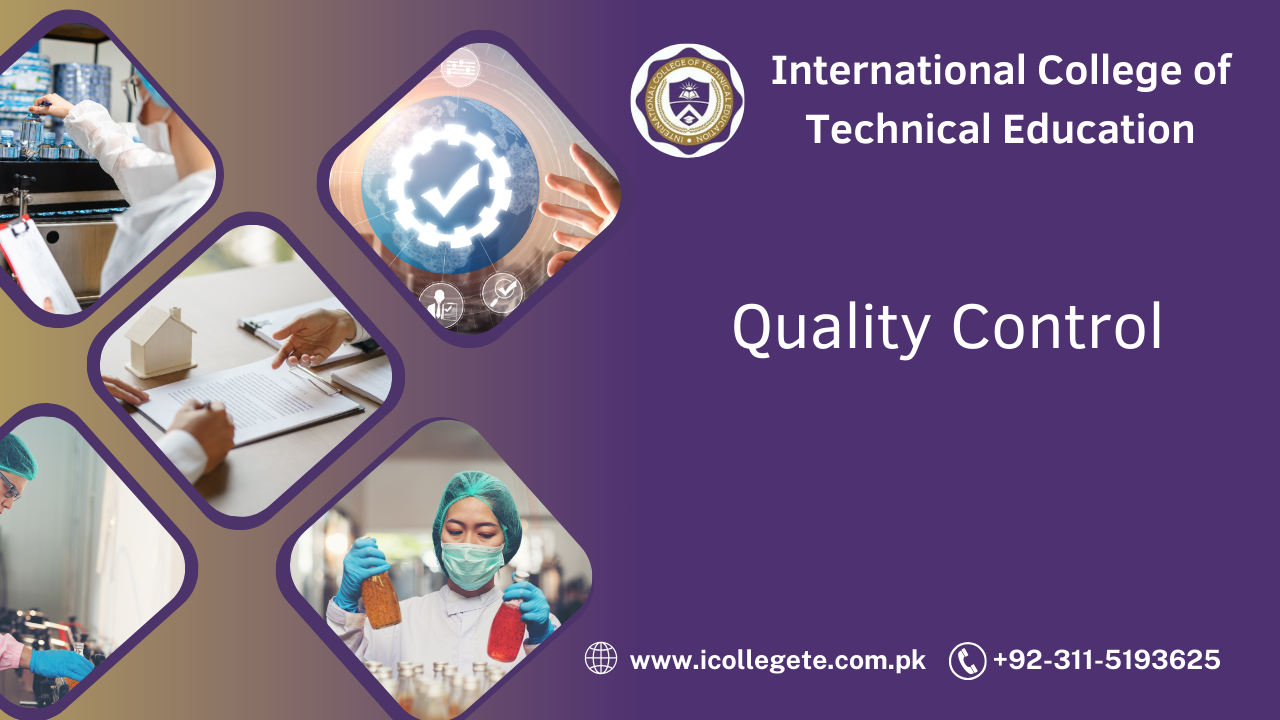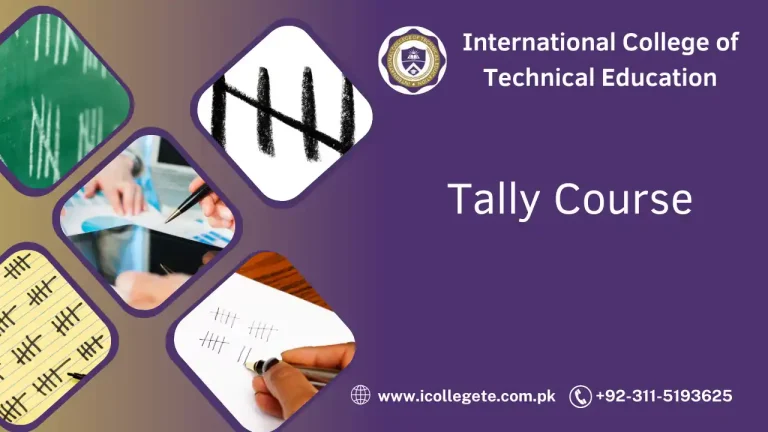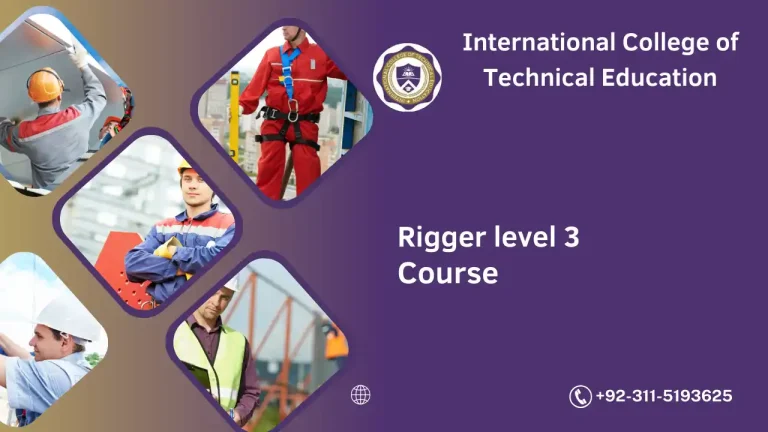In today’s highly competitive and fast-paced industries, ensuring product and service quality is more critical than ever. Whether it’s manufacturing, healthcare, or customer service, businesses must maintain high-quality standards to meet consumer expectations and regulatory requirements.
The Quality Control Course in Chakwal is designed to provide individuals with the necessary knowledge and skills to manage and implement quality control procedures effectively. The course will focus on the methods and tools used in quality management systems, and it will teach you how to apply these principles in a variety of industries. By the end of the course, students will be able to assess product quality, manage quality audits, and contribute to continuous improvement efforts within an organization.
The course is structured to provide both theoretical knowledge and practical skills, ensuring that students are well-prepared for real-world quality control challenges. Whether you are new to the field or seeking to enhance your existing skills, this course offers a comprehensive approach to quality control.
Course Overview
The Quality Control Course in Chakwal provides students with an in-depth understanding of the principles and practices involved in quality control. It covers the key concepts of quality assurance, statistical process control (SPC), testing methods, and quality management systems (QMS), among other critical topics.
Students will learn how to monitor and improve product and service quality, ensure compliance with industry standards, and understand the tools and methodologies used to analyze and rectify quality issues. The course also covers how to implement corrective actions and develop strategies for continuous improvement.
Study Units
The Quality Control Course in Chakwal is divided into several modules, each focusing on a different aspect of quality control. These study units include:
- Introduction to Quality Control
- What is quality control and its importance in various industries
- Key concepts and definitions in quality control: quality assurance vs. quality control
- The role of quality control in product development and service delivery
- Historical development of quality control principles and methodologies
- Quality Control Tools and Techniques
- Understanding statistical tools for quality control: mean, median, mode, variance, and standard deviation
- Using control charts and process maps to monitor production processes
- Flowcharts, histograms, Pareto charts, and cause-and-effect diagrams
- The role of sampling methods in quality testing
- Statistical Process Control (SPC)
- Introduction to SPC and its applications in quality control
- Understanding control limits, variation, and process stability
- How to use SPC charts to detect process anomalies and implement corrective actions
- Setting up and interpreting control charts for various processes
- Quality Management Systems (QMS)
- Overview of Quality Management Systems (QMS) and international standards (ISO 9001, etc.)
- Steps involved in implementing a QMS within an organization
- The role of quality audits and inspections in maintaining quality standards
- Continuous improvement through Total Quality Management (TQM)
- Inspection and Testing Methods
- Different types of inspection techniques: visual inspection, destructive testing, and non-destructive testing (NDT)
- Testing methods for various industries (manufacturing, food, pharmaceuticals, etc.)
- Understanding sampling plans and inspection intervals
- Calibration and maintenance of quality control equipment
- Corrective and Preventive Actions (CAPA)
- Identifying quality issues and implementing corrective actions
- Establishing preventive measures to reduce the risk of recurring quality problems
- How to document CAPA activities and maintain compliance with quality standards
- The role of root cause analysis in problem-solving
- Industry-Specific Quality Control Practices
- Quality control in manufacturing: processes, standards, and challenges
- Quality control in service industries: customer satisfaction, service delivery, and consistency
- Regulatory and compliance considerations in quality control (FDA, OSHA, etc.)
- Quality control in sectors like pharmaceuticals, food production, and electronics
- Continuous Improvement and Lean Quality Control
- Introduction to Lean methodology and its relationship with quality control
- Identifying and eliminating waste in production processes
- Using Six Sigma techniques to improve product quality and reduce defects
- Building a culture of continuous improvement within an organization
Learning Outcomes
By the end of the Quality Control Course in Chakwal, students will:
- Understand the principles and concepts of quality control and its importance in ensuring product and service excellence.
- Be able to apply various quality control tools and techniques, including statistical methods, control charts, and quality audits.
- Have the ability to monitor, assess, and improve production processes and product quality.
- Gain a solid understanding of the role of Quality Management Systems (QMS) in maintaining quality standards across industries.
- Be equipped with the knowledge to implement corrective and preventive actions to address quality issues.
- Understand the importance of continuous improvement and how to incorporate Lean and Six Sigma principles into quality control practices.
- Be familiar with industry-specific quality control standards and compliance regulations.
Course Benefits
- Industry-Recognized Skills: Gain practical and theoretical knowledge that can be applied in various sectors such as manufacturing, food, pharmaceuticals, and services.
- Job Readiness: Upon completion, you will be prepared to take on roles in quality control, quality assurance, and process management.
- Improved Career Opportunities: Quality control is an essential function across many industries. This course will open doors to numerous career paths and help you stand out in the competitive job market.
- International Standards Knowledge: Learn about international quality standards like ISO 9001, giving you a global perspective on quality management.
- Enhance Problem-Solving Skills: Learn how to use data and analysis to identify root causes of quality issues and implement effective solutions.
- Certification: Completing the course will provide you with a certification that can enhance your resume and professional qualifications.
Who is This Course For?
The Quality Control Course in Chakwal is suitable for:
- Aspiring Quality Control Professionals: Individuals looking to start a career in quality control or quality assurance within various industries.
- Industry Professionals: Existing employees in manufacturing, production, or service industries who wish to improve their quality control skills.
- Quality Inspectors: Individuals working in inspection and testing roles who want to enhance their technical knowledge and capabilities.
- Business Managers: Those responsible for ensuring quality standards in their organizations, such as operations managers, project managers, or production managers.
- Entrepreneurs: Business owners in industries such as manufacturing, food, or pharmaceuticals who need to understand and implement effective quality control systems.
Future Progression
After completing the Quality Control Course in Chakwal, students can pursue various career paths, including:
- Quality Control Inspector: Perform inspections and tests to ensure that products and services meet established quality standards.
- Quality Assurance Manager: Oversee quality assurance activities, ensuring compliance with industry standards and implementing continuous improvement strategies.
- Process Improvement Specialist: Work within organizations to identify inefficiencies and implement corrective actions to improve processes and reduce defects.
- Quality Control Supervisor: Lead a team of quality control inspectors, ensuring that quality control procedures are followed correctly in production lines or service areas.
- Compliance Officer: Ensure that an organization’s processes meet regulatory requirements and industry standards for quality management.
- Operations Manager: Oversee day-to-day operations in manufacturing or service industries, focusing on quality management and process optimization.
- Consultant: Provide quality control and assurance consulting services to businesses, helping them improve their quality standards and operations.
The Quality Control Course in Chakwal is an excellent opportunity for individuals looking to build a career in quality control or improve their expertise in the field. With a focus on real-world applications, industry standards, and continuous improvement, this course offers a comprehensive foundation for those eager to work in quality management roles across various industries. Whether you are looking to advance in your current job or enter a new field, the skills and knowledge gained from this course will set you on the path to success.







